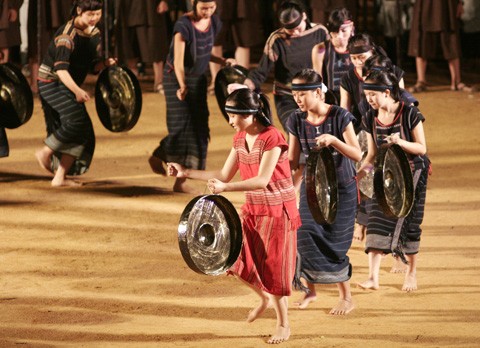(VOVworld) – When the seasonal winds blow and peach and apricot trees bloom in the forests, the central highlanders welcome a season of festival, which lasts from the end of last year to the New Year. The Ede Bih, a branch of the Ede ethnic group, who live in Trap hamlet, Krong Ana district, Dac Lac province, celebrate the spring festival by playing gongs. The sets of Jho gongs are played only by women.
 |
| In the Ede Bih community, only women are allowed to play gongs (Photo: khampha.vietnma.vn) |
70-year-old Aduon Nho has been involved in the hamlet’s gong troupe for more than 45 years. For her, playing gongs is as natural as breathing, eating and drinking. At 10, she was taught how to play a gong by her mother. A set of Jho gongs is comprised of 3 pairs: mother gongs, father gongs and child gongs. Accompanied with a drum called Hogo, the three pairs of gongs produce different chords, carrying the women’s voices to the sky, earth and ancestors. Aduon Nho told VOV:“I am very happy because I learned gongs from my mother when I was small. I am proud of the traditional culture of our Ede Bih ethnic group. The Hogo drum plays an important role in gong plying because it keeps the rhythm and makes the gong sound more appealing. In my old age, I hope o be healthy enough to continue my performances and teach the music to the young people”.
18-year-old H’Lom H’Mok has played gongs for 10 years. Joining the children’s art troupe in the hamlet, she falls in love with the gongs. She can play well and has been on performance tours all over Vietnam. H’Lom says: “In the beginning, I found it difficult to learn the gong instrument. Watching my mother play, it seemed easy, but it wasn’t. At times, I thought I would give up. But then I changed my mind. I should do my best to help preserve my ethnic traditions. When you understand the gong, you find it very interesting”.
H’Mly H’Mok, another member of the gong troupe, is passionate to explore what makes Jho gongs special: “I want to learn more difficult gong music pieces and to play them in many places to introduce our culture to as many people as I can. I hope that young people like me will grow to love more our traditional culture”.
Ms. H’Riu H’Mok, leader of the gong troupe of Trap hamlet, says the gong piece played during the new rice worshipping ritual is very important for the Ede ethnic group. The piece ends with a gong hand-over ceremony, symbolizing the passing down of responsibility. Local people believe that when elder people are unable to continue their work, they must ask their children and grandchildren to undertake the tasks of doing farm work and worshipping the god of rice.
In Trap hamlet, people of different generations are playing gongs with passion and enthusiasm. Mothers and their daughters are realizing their dream of making Jho gongs echo vibrantly in the forests.